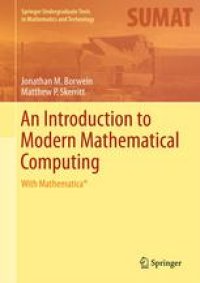
Ebook: An Introduction to Modern Mathematical Computing: With Mathematica®
- Tags: Computational Mathematics and Numerical Analysis, Mathematical Software, Simulation and Modeling, Math Applications in Computer Science
- Series: Springer Undergraduate Texts in Mathematics and Technology
- Year: 2012
- Publisher: Springer-Verlag New York
- Edition: 1
- Language: English
- pdf
Thirty years ago mathematical, as opposed to applied numerical, computation was difficult to perform and so relatively little used. Three threads changed that: the emergence of the personal computer; the discovery of fiber-optics and the consequent development of the modern internet; and the building of the Three “M’s” Maple, Mathematica and Matlab.
We intend to persuade that Mathematica and other similar tools are worth knowing, assuming only that one wishes to be a mathematician, a mathematics educator, a computer scientist, an engineer or scientist, or anyone else who wishes/needs to use mathematics better. We also hope to explain how to become an "experimental mathematician" while learning to be better at proving things. To accomplish this our material is divided into three main chapters followed by a postscript. These cover elementary number theory, calculus of one and several variables, introductory linear algebra, and visualization and interactive geometric computation.
Thirty years ago, mathematical computation was difficult to perform and thus used sparingly. However, mathematical computation has become far more accessible due to the emergence of the personal computer, the discovery of fiber-optics and the consequent development of the modern internet, and the creation of Maple™, Mathematica®, and Matlab®.
An Introduction to Modern Mathematical Computing: With Mathematica® looks beyond teaching the syntax and semantics of Mathematica and similar programs, and focuses on why they are necessary tools for anyone who engages in mathematics. It is an essential read for mathematicians, mathematics educators, computer scientists, engineers, scientists, and anyone who wishes to expand their knowledge of mathematics. This volume will also explain how to become an “experimental mathematician,” and will supply useful information about how to create better proofs.
The text covers material in elementary number theory, calculus, multivariable calculus, introductory linear algebra, and visualization and interactive geometric computation. It is intended for upper-undergraduate students, and as a reference guide for anyone who wishes to learn to use the Mathematica program.
Also by J.M. Borwein and M.B. Skerritt: An Introduction to Modern Mathematical Computing: With Maple™, © 2011, ISBN: 978-1-4614-0121-6, 216 p. and 81 color illustrations.
Thirty years ago, mathematical computation was difficult to perform and thus used sparingly. However, mathematical computation has become far more accessible due to the emergence of the personal computer, the discovery of fiber-optics and the consequent development of the modern internet, and the creation of Maple™, Mathematica®, and Matlab®.
An Introduction to Modern Mathematical Computing: With Mathematica® looks beyond teaching the syntax and semantics of Mathematica and similar programs, and focuses on why they are necessary tools for anyone who engages in mathematics. It is an essential read for mathematicians, mathematics educators, computer scientists, engineers, scientists, and anyone who wishes to expand their knowledge of mathematics. This volume will also explain how to become an “experimental mathematician,” and will supply useful information about how to create better proofs.
The text covers material in elementary number theory, calculus, multivariable calculus, introductory linear algebra, and visualization and interactive geometric computation. It is intended for upper-undergraduate students, and as a reference guide for anyone who wishes to learn to use the Mathematica program.
Also by J.M. Borwein and M.B. Skerritt: An Introduction to Modern Mathematical Computing: With Maple™, © 2011, ISBN: 978-1-4614-0121-6, 216 p. and 81 color illustrations.
Content:
Front Matter....Pages i-xvi
Number Theory....Pages 1-76
Calculus....Pages 77-137
Linear Algebra....Pages 139-193
Visualization and Geometry: A Postscript....Pages 195-209
Back Matter....Pages 211-224
Thirty years ago, mathematical computation was difficult to perform and thus used sparingly. However, mathematical computation has become far more accessible due to the emergence of the personal computer, the discovery of fiber-optics and the consequent development of the modern internet, and the creation of Maple™, Mathematica®, and Matlab®.
An Introduction to Modern Mathematical Computing: With Mathematica® looks beyond teaching the syntax and semantics of Mathematica and similar programs, and focuses on why they are necessary tools for anyone who engages in mathematics. It is an essential read for mathematicians, mathematics educators, computer scientists, engineers, scientists, and anyone who wishes to expand their knowledge of mathematics. This volume will also explain how to become an “experimental mathematician,” and will supply useful information about how to create better proofs.
The text covers material in elementary number theory, calculus, multivariable calculus, introductory linear algebra, and visualization and interactive geometric computation. It is intended for upper-undergraduate students, and as a reference guide for anyone who wishes to learn to use the Mathematica program.
Also by J.M. Borwein and M.B. Skerritt: An Introduction to Modern Mathematical Computing: With Maple™, © 2011, ISBN: 978-1-4614-0121-6, 216 p. and 81 color illustrations.
Content:
Front Matter....Pages i-xvi
Number Theory....Pages 1-76
Calculus....Pages 77-137
Linear Algebra....Pages 139-193
Visualization and Geometry: A Postscript....Pages 195-209
Back Matter....Pages 211-224
....